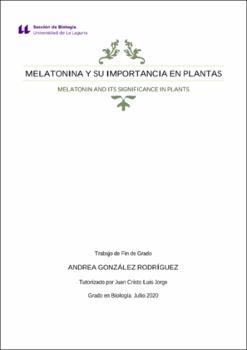Melatonina y su importancia en plantas.
Fecha
2020Resumen
La Melatonina es una molécula relativamente reciente descrita en vegetales, aunque en
animales es bien conocida. En esta revisión bibliográfica se pretende reunir los últimos estudios
relacionados con el papel de la Melatonina en las distintas etapas de la planta, así como su función
aumentando la tolerancia vegetal frente a estreses tanto abióticos (alta salinidad, temperaturas, sequía,
metales tóxicos, etc.) como bióticos, producidos por virus, bacterias u hongos. Estas funciones se
deben principalmente a su particular estructura, que le proporciona actividad antioxidante y le permite
eliminar moléculas tóxicas para la planta. Actúa como bioestimulante, bioprotectora y biorreguladora
en procesos como la germinación, el crecimiento y desarrollo vegetal, la floración, fructificación o la
senescencia foliar, regulando la biosíntesis, transporte y acumulación de fitohormonas como Auxinas,
Giberalinas (GA), Ácido Abscísico (ABA), Citoquininas (CK), Ácido Salicílico (SA), Ácido
Jasmónico (JA), etc. También es capaz de regular otras moléculas antioxidantes, metabolismos
energéticos primarios y secundarios o la homeostasis celular. Sin embargo, los mecanismos por los
que lleva a cabo la regulación de estos procesos no ha sido estudiada y sigue siendo una incógnita,
así como su posible papel como fitohormona, su utilización como tratamiento en cultivos genéricos
o su interacción y consecuencias en el entorno y otros organismos. Melatonin is a recently describe molecule in vegetable kingdom, even it’s well-known in
animals. The aim of this bibliographic review is compile the latest studies related to the role of
Melatonin on the different stages of plants, just like its function enhancing the vegetable tolerance
against abiotic stresses like high salinity or temperatures, drought, toxic molecules, etc. or biotic
stresses produced by virus, bacteria or fungus. This functions must be due to its special structure, that
provide an antioxidant activity and allows it to scavenger toxic molecules. Melatonin acts as a
biostimulator, bioprotector and bioregulator in process such as germination, vegetable growth and
development, flowering, fruition or in leaf senescence, regulating biosynthesis, transport and
accumulation of phytohormones like Auxin, Gibberellin (GA), Abscisic Acid (ABA), Cytokinins
(CK), Salicylic Acid (SA), Jasmonic Acid (JA), etc. Moreover, it is able to regulate other antioxidant
molecules, primary and secondary energy metabolisms or cellular homeostasis. Nevertheless, the
mechanisms by which it carries out that process are not study yet and they are still unknown, as the
possible role of Melatonin like phytohormone, its use as a generic crops treatment or its interaction
and consequences in its environment or other organisms.





